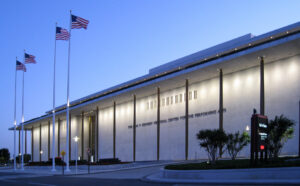By: Nadia Foster

With President Donald J. Trump’s takeover as the chairman of the John F. Kennedy Center for the Performing Arts, the cultural landmark finds itself in the middle of a debate over politics and performance. Within weeks, Trump dismissed several board members and replaced them with political allies, including former diplomat Richard Grenell as interim executive director.
Trump’s rapid changes at the Kennedy Center included firing roughly two dozen board members appointed by former President Joe Biden. It also led to the sudden cancellations of events marking LGBTQ+ Pride Month. “Tapestry of Pride,” which was supposed to be a multi-week celebration of queer voices in theater and classical music, was canceled without explanation. Several other distinguished artists, such as award-winning singer Rhiannon Giddens and composer Nico Muhly, pulled out of their scheduled performances in opposition. LGBTQ+ rights groups and artists accused the new administration of ideological censorship and cultural regression.
Trump has stated his visions for the Kennedy Center are to move away from what he calls “woke programming” and restore the institution as a “beacon of classical, patriotic, and family-friendly art.” In time, he plans to reduce showings with minority communities and push for more traditional European performances.
There are legal questions surrounding how much control Trump can exert over the Kennedy Center, which is federally funded but privately managed. While the chairman plays a key symbolic and governance role, programming and leadership decisions typically fall under the purview of the Kennedy Center president and CEO. Deborah Rutter, the long-serving president, resigned months earlier than scheduled, citing “irreconcilable differences” with the new leadership. The new interim President of the Kennedy Center is Richard Grenell.
The reshaping of the Kennedy Center under Donald Trump’s leadership has created a fierce debate, reflecting broader cultural and political divisions in the United States. Some conservatives have welcomed the changes as a much-needed adjustment and course correction for an elite institution.
Groups like the American Principles Project and Moms for Liberty have praised the new direction, saying the arts world had become exclusionary and ideologically one-sided. “For too long, institutions like the Kennedy Center have catered to elitist and progressive agendas,” said Terry Schilling, president of the American Principles Project. “Trump is returning the focus to patriotism, tradition, and family values—things that resonate with everyday Americans.”
Meanwhile, many artists, civil rights groups, and arts administrators nationwide have condemned the changes as a form of censorship.
“This is not about patriotism—it’s about silencing diverse voices,” said playwright Jeremy O. Harris, whose planned performance at the Center was shelved. “When an institution cancels LGBTQ+ programs with no explanation, that sends a chilling message.”
Other prominent figures such as Yo-Yo Ma, and Misty Copeland have also publicly expressed concern about the direction the Kennedy Center is taking. Some have quietly pulled out of engagements. The producers of the musical Hamilton canceled their plans to perform in Spring 2026, growing concern with Trump’s takeover of the Kennedy Center.
Many former Kennedy Center staff have voiced concerns about working under the new administration. One former program coordinator said, “There’s a sense of fear—people are being careful about what they say, what projects they pitch. It’s never been like this before.”
Even some moderate Republicans and Trump allies have raised eyebrows. A former senior art advisor during the Trump administration privately admitted that canceling Pride events without comment was “a strategic mistake,” according to NPR.
Evidently, Trump’s Kennedy Center has become a symbolic feature in the cultural and political divide throughout the nation. For some, it’s a return to traditional American values in the arts. For others, it’s the beginning of a dangerous slide toward ideological control.


